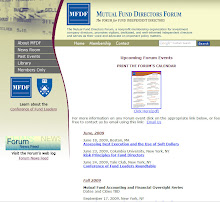Yesterday, the Obama Administration released its comprehensive plan for regulatory reform of the financial system in a white paper entitled, "Financial Regulatory Reform: A New Foundation." Among the many things this sweeping 88 page plan proposes is the creation of the much debated Consumer Financial Protection Agency (CFPA) "dedicated to protecting consumers in the financial products and services markets." The plan for the CFPA leaves the existing regulatory powers of the SEC and CFTC intact, and envisions expanding the powers of the two agencies to fill some notable regulatory gaps.
Among the specific expansions of the SEC's powers named in the whitepaper were the regulation of hedge funds and the regulation of money market mutual funds:
The full text of the white paper is available at: http://www.financialstability.gov/docs/regs/FinalReport_web.pdf
We propose the creation of a single federal agency, the Consumer Financial Protection Agency, dedicated to protecting consumers in the financial products and services markets, except for investment products and services already regulated by the SEC or CFTC.The plan describes the powers and duties of the CFPA as:
. . .
[W]e propose new authorities for the Securities and Exchange Commission to protect investors, improve disclosure, raise standards, and increase enforcement.
[C]onsolidated authority over the closely related functions of writing rules, supervising and examining institutions’ compliance, and administratively enforcing violations. The CFPA should reduce gaps in federal supervision; improve coordination among the states; set higher standards for financial intermediaries; and promote consistent regulation of similar products. Nothing in this proposal is intended to constrain the Attorney General’s current authorities to enforce the law or direct litigation on behalf of the United States.The ultimate goal of the CFPA is to, "give consumer protection an independent seat at the table in our financial regulatory system." Presumably, the new CFPA will coordinate its own consumer protection activities with those of the SEC and CFTC, as well as the state securities regulators.
Among the specific expansions of the SEC's powers named in the whitepaper were the regulation of hedge funds and the regulation of money market mutual funds:
Require Advisers To Hedge Funds and Other Private Pools Of Capital To Register With The SEC:
To protect investors, the President’s plan requires all advisers to hedge funds ‐‐ and other private pools of capital, including private equity funds and venture capital funds ‐‐ whose assets under management exceed some modest threshold to register with the SEC under the Investment Advisers Act.
Advisers will be required to report a sufficient amount of information on their managed funds that will allow for a proper assessment of whether any funds pose a threat to financial stability.
Improve The Regulation Of Money Market Mutual Funds:
As part of the President’s plan, the regulatory framework for money market mutual funds (MMFs) will be strengthened. The President’s Working Group on Financial Markets will consider whether more fundamental changes are needed to make the MMF industry less vulnerable to runs.
The full text of the white paper is available at: http://www.financialstability.gov/docs/regs/FinalReport_web.pdf





